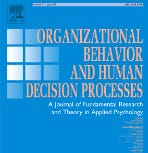New article in OBHDP (June 14th, 2024)
“Abuser” or “tough love” boss?: The moderating role of leader performance in shaping the labels employees use in response to abusive supervision
https://www.sciencedirect.com/science/article/pii/S0749597824000311
Robert B. Lount, Woohee Choi, Bennett J. Tepper
Whereas scholars would characterize the hostile behaviors of leaders such as Steve Jobs, Bobby Knight, and Vince Lombardi as “abusive supervision,” some employees might characterize those same leaders as “master motivators,” “demanding,” or “tough love” bosses. To address these conflicting characterizations, the authors examine the circumstances under which employees come to perceive their managerial leaders as “abusers” or “tough love” bosses. Across a field study and experiment, the authors found that employees’ labeling of abusive supervision was dependent on whether the leader was seen as a high performer. High-performing leaders were more likely to be labeled as tough love bosses, and less likely to be labeled as abusers. This research provides insight into why organizations may be ambivalent, and often accepting of, hostile managerial leaders. Unfortunately, high-performance may cloud the perception that a leader’s hostile behavior is truly detrimental, leading to an erroneous conclusion that corrective action is unnecessary.
Introduction to the special issue: Allyship, advocacy, and social justice to support equality for marginalized groups in the workplace
https://www.sciencedirect.com/science/article/pii/S0749597824000281
Ellen Ernst Kossek, Jamie Ladge, Laura M. Little, Denise Lewin Loyd, Alexis Nicole Smith, Catherine H. Tinsley
This article serves as an introduction to the special issue on allyship, which has articles spread across several issues of the journal. Allyship is an important topic in research and practice for organizations. Despite a growing interest in the topic, this research stream is still in its infancy. Consequently, allyship research is often fragmented across disciplines, contributing to a lack of conceptual clarity. The purpose of this special issue is to enhance understanding of allies and allyship. The authors argue that allyship is a mechanism for centering social justice, reducing discrimination and inequality, and improving intergroup dynamics, inclusion, social cohesion, well-being, and organizational effectiveness. This introduction examines the theoretical and empirical contributions of each article in the special issue. The authors outline that the articles provide a springboard for understanding how to define, measure, and evaluate allyship; the articles in this issue also help identify allyship’s key dynamics, antecedents, consequences, contexts, and boundary conditions. The article concludes by identifying future research opportunities that leverage this special issue’s content.
P.S. if you can’t access the full-text let us (m-kouchaki@kellogg.northwestern.edu or mikebaer@asu.edu) know and we’d be happy to share a copy.


